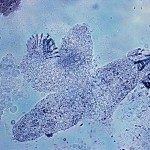Evie Melanitou received her Ph.D. degree in Molecular and Cellular Pharmacology, option Endocrinology, followed by a Doctorat d’Etat es Sciences (DrSc) in Natural Sciences (1991) from the Pierre & Marie Curie University (Paris VI) in France. She holds a M.S in General Biology from the “Physics and Mathematics” department of the University of Patras, Greece and she studied in Paris at the Master’s level, Physiology (UPMC, Paris VI University) and Molecular Biology (Paris VII University).
She completed her three years postdoctoral training in the Centre for Biomedical Research at the Rockefeller University, NY, USA. In 1986 she joined the Institut Pasteur (Immunology Department) where she completed her DrSc Degree.
EM holds an assistant professor (chargée de recherche expert) position at the Institut Pasteur, Paris and she is permanent member since 1992. Her current research focus stands on the genetics of autoimmune diseases and in particular Type 1 diabetes. She has been interested in the investigation of interactions between genetic predisposition and environmental influences in autoimmune diseases.
In 2002, she was invited by Professor G. Eisenbarth to join the Barbara Davis Centre for childhood diabetes (University of Colorado, Denver, CO, USA). During her 18 months sabbatical stay as a visiting professor, she initiated a genomics approach and addressed the early pre-inflammatory events taking place in type 1 diabetes. Genetic and functional insights issued from her work indicate that several of the identified genes play a role in the host response to infections and she has identified and analyzed a set of secreted protein-coding genes as potential early biomarkers for type 1 diabetes.
Her work focuses on the impact of the environment, and in particular of infectious microorganisms in the initiation of autoimmune disorders through the study of one of the genes she has identified, coding for osteopontin. Osteopontin or early T-lymphocyte activation (ETA-1), secreted phosphoprotein (SPP1) is a pleiotropic protein, playing a role in adaptive immunity and is expressed in activated T cells, macrophages and dendritic cells. Osteopontin is implicated in the host response to infectious microorganisms and plays a role in autoimmune diseases. She has established opn knock out mice in the autoimmune NOD and SJL genetic backgrounds to address the role of OPN on Type 1 diabetes in relation with infections.
Evie Melanitou’s particular aim is to focus her research on Mediterranean or other populations in which autoimmune diseases are less prominent than in industrialized countries while infectious microorganisms have been present throughout the population history.
CV
Publications
Download-
2024Bone marrow monocytes sustain NK cell-poiesis during non-alcoholic steatohepatitis, Cell Reports, 2024, 43 (1), pp.113676. ⟨10.1016/j.celrep.2024.113676⟩.
-
2024Type 1 diabetes and parasite infection: An exploratory study in NOD mice., PLoS One 2024 ; 19(10): e0308868.
-
2020Investigation of type 1 diabetes in NOD mice knockout for the osteopontin gene., Gene 2020 Aug; 753(): 144785.
-
2019Osteopontin in the host response to Leishmania amazonensis., BMC Microbiol 2019 Feb; 19(1): 32.
-
2017Autoimmunity and autoinflammation: A systems view on signaling pathway dysregulation profiles., PLoS One 2017 ; 12(11): e0187572.
-
2015Genetic architecture of early pre-inflammatory stage transcription signatures of autoimmune diabetes in the pancreatic lymph nodes of the NOD mouse reveals significant gene enrichment on chromosomes 6 and 7., Meta Gene 2015 Dec; 6(): 96-104.
-
2013Investigation of secreted protein transcripts as early biomarkers for type 1 diabetes in the mouse model., Gene 2013 Jan; 512(1): 161-5.
-
2009Early over expression of messenger RNA for multiple genes, including insulin, in the Pancreatic Lymph Nodes of NOD mice is associated with Islet Autoimmunity, BMC Med Genomics 2009;2:63.
-
2005The autoimmune contrivance: genetics in the mouse model., Clin Immunol 2005 Dec; 117(3): 195-206.
-
2005Interferon-alpha as a mediator of polyinosinic:polycytidylic acid-induced type 1 diabetes, Diabetes 2005 Sep;54(9):2549-56.
-
+View full list of publications

